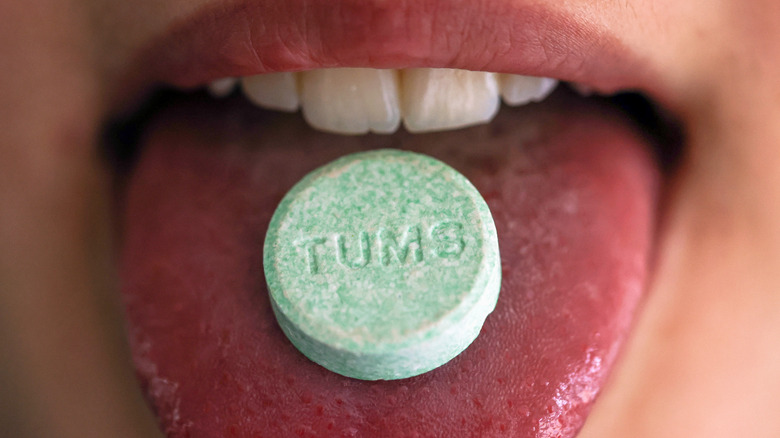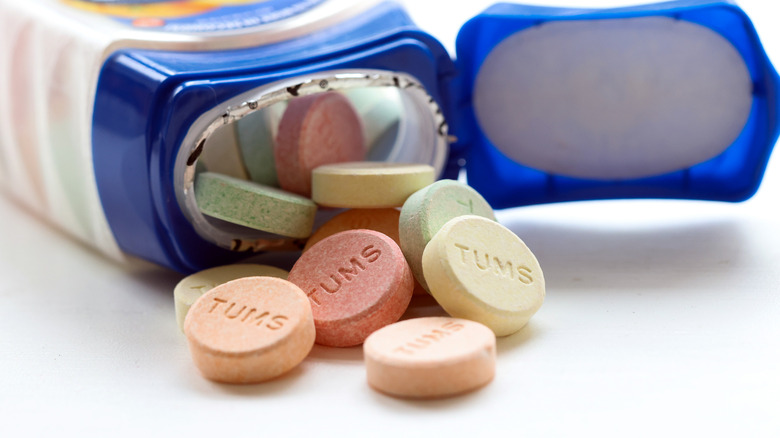When You Eat Too Many Tums, This Is What Happens
Thank goodness for stomach acid. Without it, there'd be no digesting the food you eat, according to certified nutrition specialist Erica Zellner, MS (via Parsley Health). Digestion begins with the release of salivary juices that continues the work that your teeth just did, breaking down the food so that it may pass smoothly from the mouth to the throat to the esophagus and through the esophageal sphincter to the stomach, where if it weren't for a nice, low pH of somewhere between 1.5 and 3.5, digestion could not proceed (via Parsley Health). The acid in your stomach (aka hydrochloric acid) is there, along with the enzymes lipase and pepsin, to break the food down further into digestible amino acids, inhibit the growth of any pathogens that came into the body with the food, and otherwise usher what's now left in the stomach into the intestines for many more much-needed hours of further digestive action.
Nevertheless, too much of a good thing is still too much, and that applies to stomach acid. Luckily, over-the-counter antacids have a brilliant track record when it comes to neutralizing stomach acids for the purpose of relieving the uncomfortable symptoms of excess stomach acid, which can present as heartburn, indigestion, and sour stomach. Antacids come in a variety of formulations, including the one in Tums, which is calcium carbonate. Let's take a look at what calcium carbonate is, what it does, and most importantly, what happens when you take too much of it.
Tums uses calcium carbonate to neutralize stomach acid
The active ingredient in Tums is calcium carbonate. A base, it neutralizes acids on contact, which can help to quickly relieve the symptoms of excessive stomach acid, including heartburn, bloating, sour stomach, and indigestion. Many people who take Tums do so exclusively for the acid-neutralizing effects. However, some people take it for the purpose of calcium supplementation — which is recommended for those who may not be getting enough calcium through dietary means (via Hopkins Medicine).
Calcium carbonate is a mine-sourced non-animal-based type of calcium, which makes it a good choice for vegans, according to Tums. Since calcium carbonate has 40% elemental calcium by weight, it's one of the most efficient forms of calcium supplementation, according to Harvard Medical School. Available in pill strengths of 500 milligrams, 750 milligrams, and 1000 milligrams, each Tums pill delivers 200-400 milligrams of calcium, which can help get you to the recommended daily allowance for adults of 1,000 milligrams.
As with any calcium supplement, however, if you take too much, you run the risk of raising the levels of calcium in your blood to a point beyond optimal. But with calcium carbonate, the risk is somewhat elevated because it may increase calcium blood levels faster than other sources, per a 2003 study published in the Asia Pacific Journal of Clinical Nutrition. The potential consequences of elevated blood calcium levels are discussed below, along with the other potential risks associated with eating too many Tums.
Eating too many Tums may cause motility issues
Ironically enough, although Tums is marketed for the treatment of the stomach upset associated with heartburn, sour stomach, and acid indigestion, there is a fairly decent chance that if you pop too many Tums, you may find yourself spending excessive time on the toilet for another reason: constipation. In fact, constipation is the number one most common complaint associated with taking more than what is the recommended dosage of Tums, according to GoodRX, which attributes the related slowdown in gut motility to the presence of excess calcium.
On the other hand, there is also research out there that suggests that calcium carbonate does not cause constipation in healthy women at levels up to 500 milligrams per day, via a 2016 study published in Canadian Journal of Dietetic Practice and Research. In fact, taking too many Tums has been known in some people to cause the occasional case of diarrhea, per National Health Service. However, diarrhea is more frequently associated with other types of antacids, including proton pump inhibitors and H2 blockers, according to WebMD.
Ultimately, as LiveStrong points out, if you're frequently taking Tums at levels greater than 500 milligrams per day or if you're already experiencing constipation even before you begin taking Tums, then you might want to consider trying an antacid that contains a lower level of elemental calcium — such as one whose active ingredient is calcium citrate — and see if that helps with your symptoms.
Too many Tums may cause nausea and/or vomiting and other symptoms of hypercalcemia
As noted above, one of the consequences of eating too many Tums is elevated levels of calcium in the blood. The normal range for serum calcium is between 4 and 6 milligrams per deciliter, according to American Family Physician. Levels of over 10.5 may be diagnosed as "hypercalcemia," which can also occur in sequelae with at least 25 different disease processes, including parathyroid dysfunction and certain cancers (via Cleveland Clinic). This may cause a number of health issues even while presenting no symptoms whatsoever, according to Mayo Clinic. As hypercalcemia becomes more severe, symptoms may include digestive distress, including nausea, vomiting, constipation, and loss of appetite. The associated loss of appetite could explain why it is that some people appear to be taking Tums for the sole purpose of weight loss (per Nemechek Consultative Medicine).
In addition to nausea, vomiting, and a diminished appetite, severe hypercalcemia may cause confusion and other neurological symptoms, according to American Bone Health. The Mayo Clinic attributes this to the fact that severe hypercalcemia can interfere with the brain's circuitry. A 2016 study published in the Journal of the American Academy of Neurology went so far as to suggest that in some populations — namely, elderly women with pre-existing cerebrovascular disease — calcium supplementation at any level may be associated with a higher risk of developing dementia.
Taking too many Tums can cause heart problems
When you start popping Tums on a daily basis, your blood calcium levels may become high enough to be considered, as a diagnostic matter, hypercalcemic. When hypercalcemia becomes severe enough (starting at around 14 milligrams per deciliter, where somewhere between 4 and 6 is considered normal, per American Family Physician), it can, in rare cases, cause damage to the heart. This damage may present as lightheadedness, fainting, heart palpitations, or cardiac arrhythmia, per the Mayo Clinic.
However, taking too much calcium carbonate (the active ingredient in Tums) or any other form of calcium supplementation — even at levels that do not rise to clinical hypercalcemia — may contribute to cardiovascular disease (via the Cleveland Clinic). For example, hypercalcemia may lead to calcium deposits in the arteries. Calcium deposits are like fatty deposits, except they are made of calcium instead of fat, and are caused by excess calcium in the blood as opposed to high LDL cholesterol levels.
Whatever the cause, plaque deposits have the effect of interfering with optimal circulation, which itself has numerous consequences, including heart attack. In fact, a 2020 metanalysis of 11 different studies on the effects of calcium supplementation, which was published in the BMJ, found that people who took calcium supplements were more likely to have a heart attack than those who were unwittingly given a placebo. That said, Harvard Health Blog points out that other studies have found no such relationship.
Too many Tums can lead to vitamin deficiencies
Although "acid" may sound like a strong word, the acidic environment that comprises the human digestive tract is essential to the body's ability to draw nourishment from the foods that we eat, according to the medical professionals over at the Healing Duo.
Moreover, as Healthline points out, that acidic environment must be, in fact, strongly acidic. How acidic are we talking about, exactly? How about, more acidic than a tomato? Or even more acidic than apple cider vinegar, per US News. That makes sense when you think about it, because if acid is essential to digestion, then the acid we're talking about would have to be stronger than the foods we actually eat.
Turning now to the consequences of maintaining your stomach's pH at an unnaturally high (i.e., alkaline, which is the opposite of acidic) level — which is what is happening when you eat Tums every day — research has shown that there is a direct correlation between the regular suppression of stomach acid via the taking of antacids and vitamin deficiencies (via Healing Duo). Particularly, a significant body of research demonstrates that this regular suppression is associated with vitamin B12 deficiency (per a 2012 study). That being said, much of this research involved gas-reducing active ingredients that were not specifically calcium carbonate. Nevertheless, the same logic would seem to apply (i.e., taking medication to reduce stomach acid on a regular basis may interfere with absorption of vitamins such as B12).
Taking too many Tums may decrease absorption of some medications
If you eat Tums every day, you could be inadvertently reduce the effectiveness of some of the prescription medications you may be taking. One example is the antibiotic tetracycline, which is used to treat bacterial pneumonia and other respiratory tract infections, as well as infections of the eyes, genitals, skin, and urinary tract, and is relied upon by some people who are allergic to penicillin (per MedlinePlus). For that reason, it is advisable to take tetracycline either two hours before or six hours after taking Tums (as well as other antacids and calcium supplements). Another antibiotic, gemifloxicin, which is prescribed for the "acute exacerbation of chronic bronchitis," should never be taken simultaneously with Tums or other sources of calcium carbonate, according to a 2013 study published in the journal Antimicrobial Agents and Chemotherapy.
Routinely taking Tums may also interfere with the effectiveness of the bone-building medications Boniva and Zometa. With regard to Boniva, which is taken in pill form, this may be circumvented by waiting to take Tums at least 30 minutes after taking Boniva or its generic equivalent (ibandronate), according to Drugs.com. Although Zometa is given intravenously (thereby bypassing the digestive tract altogether), its effectiveness may also be diminished if you're taking Tums regularly, according to Medscape.
Taking Tums with the anti-seizure medication dilantin may also reduce its effectiveness, per Drugs.com. Thus, it's important to tell your prescribing doctor if you take Tums.
Eating too many Tums may increase blood levels in the body of some medicines
Although taking Tums can reduce the effectiveness of certain medications, particularly when taken simultaneously or in close proximity (per WebMD), if you eat too many Tums, you also run the risk of raising the blood levels of other medications that you may be taking.
Although some medications work better in the body when taken with drug agents that boost the levels of those medications in the blood — including the anti-viral medication nirmatrelvir, which is one of the active ingredients in Paxlovid, Pfizer's COVID-19 pill – doing so without the knowledge and guidance of your healthcare provider is never advised.
One example of a drug whose blood concentrations increase in the presence of the calcium carbonate in Tums is digoxin. Also sold under the brand name Lanoxin, this foxglove-derived medication is an important tool in the treatment arsenal for heart failure and the related buildup of fluid that may occur in the body as a result, per WebMD. It is also used to treat atrial fibrillation. Foxglove and its medicinal derivations can be poisonous if not taken according to medical advice (via the American Association for the Advancement of Science). Fortunately, digitalis toxicity is less common now that more people, both laymen and medical professionals, are aware of this interaction (per Medscape). Accordingly, best practices demand checking with your doctor before even taking an over-the-counter drug, if it's one that you have not taken before.
Eating Tums with certain foods may make Tums less effective
If you've been taking Tums to relieve acid indigestion and similar digestive complaints (since such complaints often coincide with eating or drinking), it's possible you've never had to give much thought to whether Tums should be taken with food. In fact, as a general rule, it should be (per the Mayo Clinic), as the active ingredient in Tums, calcium carbonate, is better absorbed by the body when in the presence of food. Nevertheless, there are certain foods considered exceptions to this rule.
Just as repeatedly popping Tums can interfere with your body's ability to absorb nutrients, taking Tums with certain foods can actually interfere with your body's ability to absorb calcium carbonate, per Drugs.com. Ironically, some of those foods may be to blame, at least partly, for your gastrointestinal discomfort. They include those that are high in oxalic acid and those that are high in phytic acid.
Oxalic acid levels are particularly high in spinach (755 milligrams per half-cup serving), via WebMD. Beets are also high in oxalic acid (152 milligrams per cup). Although almonds deliver only 122 milligrams of oxalates per 22-almond serving, it's worth considering that almonds can add up very quickly, and if you eat as many as six servings, that's the equivalent of the oxalate in a half cup of spinach. Almonds may also be high in phytic acid along with other nuts, as well as beans, grains, and seeds (per WebMD).
Eating too many Tums may increase your risk of developing food sensitivities and the severity of food allergies
You know how there's an old saying that you can't step into the same river twice? The idea is that by stepping into the river, you're changing it irrevocably. Well, the same is true of your digestive tract. Whatever you put into it is going to change it, whether it's food, beverage, medication, or, specifically, antacid — and, generally speaking, that's a good thing. In fact, there is scientific evidence that the more one's microbiome changes over time, the better off they will be in terms of health and longevity, per The New York Times.
Nevertheless, not all change is good. To wit, studies show that when you consistently change the pH of your digestive tract over time by reducing its acid content, you run the risk of changing your microbiome such that it can no longer easily digest certain foods. In other words, if you eat Tums every day, you could start experiencing new food sensitivities, per Science Direct and Allergy Amulet.
"By increasing the gastric pH, [acid suppression medications] interfere substantially with the digestive function of the stomach, leading to persistence of labile food protein during gastric transit. Indeed, both murine and human studies reveal that antiulcer medication increases the risk of food allergy induction," according to a 2008 study published in the Journal of Allergy and Clinical Immunology.
Overdoing the Tums can put you at risk for infection
Another risk that goes along with taking too many Tums is that doing so may increase your susceptibility to infections from all four kinds of pathogens, per the Healing Duo. And that's not just viruses and bacteria, but also pathogens in the nature of fungi and parasites (per Healthline). The highly acidic environment of your digestive tract does not just serve the purpose of digesting food and extracting nutrients needed by the body. It is also what the Healing Duo refer to as "the body's first line of defense" against harmful pathogens.
In a 2012 study published in the journal BMC Medicine, antacids can "indirectly affect the immune system by enabling enhanced bacterial growth in the stomach and small intestine." In 2016, Prevention pointed out that 70% of our immune system is actually attributable to the chemical makeup and function of the digestive tract. According to Dr. Susan Blum, author of "The Immune System Recovery Plan" and founder and director of Blum Center for Health, some antacids (particularly Tums) absorb acid so effectively that they can lower the pH of your stomach, which is "supposed to be incredibly acidic in order to sterilize all the food you eat. When your stomach can't properly sterilize your food, you end up bringing more infections into your body, which places additional stress on the immune system in your gut."
If you're allergic to this food dye, you should avoid taking Tums altogether
Tartrazine is the food dye that gives jelly beans their bright colors, per the Allergic Contact Dermatitis Database. Tartrazine is the second most commonly used food coloring, according to News-Medical, so you'll find it in many foods, including cotton candy, Doritos (the color of the nacho cheese has to come from somewhere!), cake, custard, and pudding mixes, Kool-Aid, Mountain Dew, jam, jelly, gelatins, pickles, and cough drops.
You know what else contains tartrazine? If you guessed Tums, go to the head of the class (via the National Institutes of Health). The pretty pastel colors that you see on these antacids come from this particular additive, and for most people, this presents no problem whatsoever. However, a small percentage of the population is allergic to tartrazine, per News-Medical. In those who are, the most common symptoms are those typically seen in contact dermatitis and seasonal allergies, which is to say, nasal congestion, hives, and other skin rashes.
In some who are sensitive to tartrazine, taking Tums may induce an asthma attack and other difficulties in breathing. WebMD recommends seeking immediate attention if you notice any symptoms of an allergic reaction after you take Tums.
Eating too many Tums may lead to kidney stones and even more serious kidney problems
Nephrologists and other medical professionals involved in kidney care may advise patients with poor kidney function to take Tums. The calcium in Tums bonds to phosphorous from the foods you eat, allowing the phosphorous to be cleared via the digestive tract. This is a task usually performed by the kidneys, but which diseased kidneys have trouble doing (per Nova Scotia Health).
Nevertheless, Tums and other calcium-based antacids may increase one's risk of developing kidney stones, according to Kaiser Permanente. And if you're taking Tums every day, then you're upping your risk even further. To mitigate the risk, Kaiser Permanente advises taking Tums with meals and stopping when you get to 1,200 milligrams of calcium each day. That will require some level of mindfulness because Tums come in various strengths, ranging from around 650 to around 1,250 milligrams.
But the formation of calcium deposits is not all that's at risk to your kidneys when you're regularly popping calcium-based antacids. According to the Mayo Clinic, if you take enough to become clinically hypercalcemic (which refers to blood levels that are no less than two times higher than what is considered normal, per American Family Physician), you may be excessively taxing your kidneys. "Excess calcium makes your kidneys work harder to filter it," the Mayo Clinic explains. Signs that you may be overworking your kidneys include frequent urination and excessive thirst.
Excessive Tums-taking can cause Milk-Alkali Syndrome
Back when the only treatment for an ulcer that formed in the stomach lining (i.e., peptic ulcer) was calcium — in the form of milk plus sodium bicarbonate, and later, calcium bicarbonate — people with ulcers were at a significant risk for developing something called "milk-alkali syndrome," per Popular Science.
Milk-alkali syndrome is actually a triad of conditions, all three of which relate to elevated calcium levels (via StatPearls). The first of these conditions is hypercalcemia, which is discussed above. The second is alkalosis, which is clinically diagnosed in people whose pH measures greater than 7.5. In other words, alkalosis refers to having too little acid in the body (per StatPearls). The third condition is kidney injury, which, as discussed above, can occur with hypercalcemia.
Nowadays, milk-alkali syndrome is far less common because there are alternative treatments for ulcers, including proton pump inhibitors and H2 blockers (via SingleCare). However, it is still possible to develop milk-alkali syndrome from overdoing the calcium-based antacids such as Tums, as was demonstrated by a case study presented by Dominique Vanpee in 2000 (per WebMD). In that case, a 64-year old Belgian man who had been taking 10 calcium-based antacids per day presented with "confusion, nausea, vomiting, and weakness" and was subsequently diagnosed with milk-alkali syndrome.
If you're taking Tums on a daily basis, you may be overlooking important signs from your body
The instructions for taking Tums say that adults and children ages 12 and over may take anywhere from two to four Tums tablets to treat symptoms as they occur. The instructions also very clearly state, "Do not take for symptoms that persist for more than 2 weeks unless advised by a doctor." We bring this up at this juncture because up until now, we have been talking about what happens when you take too many Tums, and the presumption has been that this over-taking of Tums has been happening over an extended period of time. The fact is that some of the symptoms that you may be treating with Tums may actually be warning signs from your body that something is amiss.
For example, although the occasional bout of heartburn may be triggered by something you ate, chronic heartburn may be a sign of GERD (gastroesophageal reflux disease). Heartburn can become chronic with obesity, lack of exercise, and smoking, all of which can be addressed organically (i.e., through weight loss, exercise, and smoking cessation) rather than by taking Tums, per the Healing Duo. In addition, heartburn may be a sign of pregnancy or a hernia. It could also be connected to a medication you're taking. In each of those cases, you would be doing your body a favor by addressing the root cause, rather than camouflaging it by taking Tums.
Taking Tums regularly may improve your cholesterol profile
Since too much of anything is still too much, it stands to reason that when we talk about what happens when you take "too many" Tums, we're going to be focusing primarily on the negatives. However, not everyone takes Tums for tummy troubles. Some people take Tums for the calcium supplementation that it offers via its active ingredient, calcium carbonate. Those that do, do so daily for an extended period. For those who can't seem to get enough calcium from the foods they consume, Tums offers a workable alternative, according to the Oregon State University.
As it turns out, taking Tums regularly offers another potential benefit. According to a 1992 study published in JAMA Internal Medicine, calcium supplementation may help lower high blood cholesterol levels. In that study, 56 people diagnosed with high cholesterol were fed a low-fat, low-cholesterol diet, receiving calcium carbonate with their meals. The other half were given a placebo. Over a 12-week period, those who had been given calcium supplementation saw a drop in their LDL (bad cholesterol) by 4.4% on average. They also enjoyed a 4.1% increase in their levels of HDL (good cholesterol). The calcium-supplement group also saw improved LDL to HDL ratios.
Ultimately, the researchers concluded that taking the active ingredient in Tums on a daily basis can help improve your cholesterol profile. In 2014, Harvard Health pointed out that this is particularly true for post-menopausal women.















